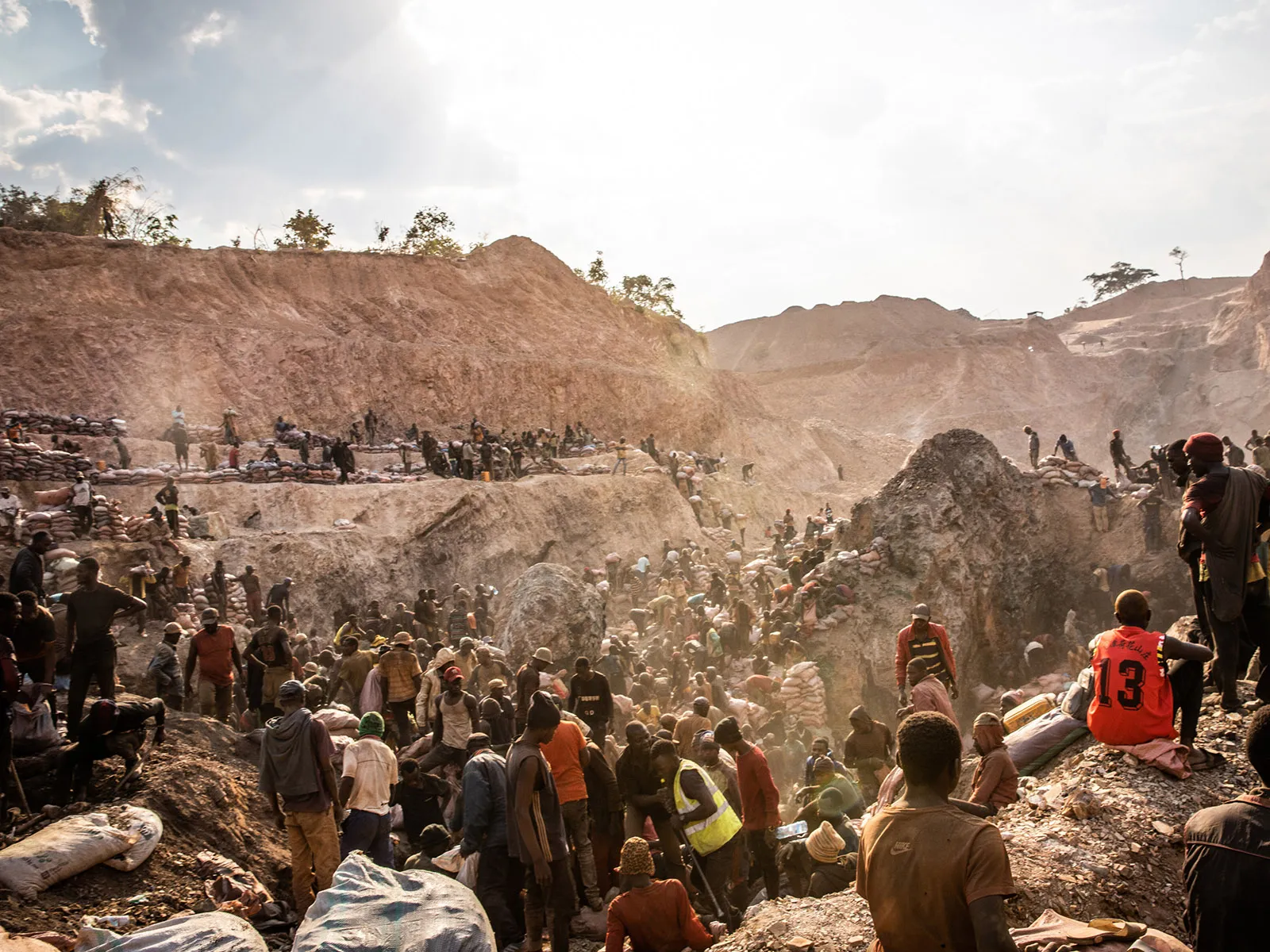Analyzing The Impact Of Congo's Cobalt Export Ban And The Expected Quota Plan

Table of Contents
The Current State of Cobalt Mining in the DRC
The DRC produces over 70% of the world's cobalt, making it a dominant force in the global market. This dependence, however, masks a complex reality. Cobalt mining in the DRC is characterized by a dual system: industrial mining and artisanal mining. Large-scale industrial mining operations, often run by multinational corporations, contribute significantly to the country's cobalt output, employing thousands and adhering (ideally) to international standards. However, artisanal mining, involving thousands of often impoverished individuals digging by hand, accounts for a significant portion of production, raising significant ethical and safety concerns.
-
DRC's Cobalt Production and Global Market Share: The DRC's unparalleled cobalt production significantly influences global supply and prices. Any disruption to this production directly impacts the availability and cost of cobalt worldwide.
-
Artisanal vs. Industrial Mining: The contrast between these two mining methods highlights the complexities of the DRC's cobalt sector. Artisanal mining, while providing livelihoods for many, often lacks safety regulations, leading to accidents and worker exploitation. This contrasts sharply with the more regulated industrial sector.
-
Environmental and Social Concerns: Both forms of cobalt mining present environmental and social challenges. Industrial mining can lead to habitat destruction and water pollution, while artisanal mining often contributes to deforestation and soil erosion. The social impacts include child labor, poor working conditions, and inadequate worker protections.
-
Key Statistics:
- DRC produces over 70% of the world's cobalt.
- Artisanal mining accounts for a significant (though debated) portion of cobalt production, raising ethical and safety concerns.
- Environmental degradation from mining activities poses a significant challenge, impacting local communities and ecosystems.
Potential Impacts of a Complete Cobalt Export Ban
A complete cobalt export ban by the DRC would have catastrophic consequences for the global cobalt market. The immediate impact would be a severe shortage of cobalt, leading to a dramatic price surge. This price volatility would have cascading effects across various industries, most notably the rapidly expanding electric vehicle (EV) sector.
-
Impact on Global Cobalt Supply: A ban would create an immediate and severe supply gap, disrupting production timelines for manufacturers reliant on DRC cobalt.
-
Price Surges and Cascading Effects: The resulting price increases would impact the affordability and availability of EVs, potentially hindering the global transition to electric mobility. Other sectors relying on cobalt, such as aerospace and electronics, would also be significantly affected.
-
Geopolitical Implications and Trade Disputes: Such a drastic measure could spark geopolitical tensions, leading to trade disputes and potentially exacerbating existing international relations. Countries and companies would scramble to secure alternative cobalt sources, leading to increased competition and potentially unethical sourcing practices.
-
Key Consequences:
- Severe cobalt shortages leading to exponentially increased prices.
- Disruptions to the EV industry's production timelines and targets, delaying the global shift towards sustainable transportation.
- Increased pressure to diversify cobalt sourcing, potentially leading to new conflicts and environmental issues in other mining regions.
- Potential for political instability in the DRC due to economic disruption.
The Proposed Cobalt Quota System: A Viable Alternative?
As an alternative to a complete ban, the DRC is considering a quota system to regulate cobalt exports. This aims to balance the country's desire for greater economic benefits from its natural resources with the global need for a stable cobalt supply. However, the success of such a system hinges on effective implementation and enforcement.
-
Goals and Intended Outcomes: The quota system aims to ensure a fairer distribution of cobalt revenues within the DRC while preventing a complete disruption of the global supply chain.
-
Effectiveness and Challenges: The effectiveness of a quota system depends heavily on transparency, equitable allocation of quotas, and robust monitoring mechanisms to prevent corruption and illegal exports.
-
Implementation and Enforcement: A major challenge lies in establishing and enforcing a fair and transparent quota allocation process, preventing favoritism and corruption. This requires significant investment in regulatory capacity and international cooperation.
-
Key Considerations:
- Aims to balance domestic economic benefits with global supply needs.
- Potential for corruption and loopholes in implementation, undermining its effectiveness.
- Requires robust monitoring and regulatory frameworks to ensure transparency and accountability.
- Uncertainty regarding the specific quota allocation and its actual impact on global markets.
Strategies for Mitigating the Impact of Congo's Cobalt Policies
Mitigating the potential negative impacts of Congo's cobalt policies requires a multi-pronged approach encompassing diversification of sourcing, technological innovation, and ethical sourcing initiatives.
-
Alternative Cobalt Sourcing: Exploring and developing cobalt mines in other countries is crucial to reduce reliance on the DRC. This requires significant investment in exploration and mining infrastructure in alternative locations.
-
Cobalt Recycling and Reuse: Investing in and scaling up cobalt recycling technologies is essential to recover cobalt from end-of-life batteries and electronic waste, reducing demand for newly mined cobalt.
-
Ethical and Sustainable Mining: Promoting and supporting ethical and sustainable mining practices in the DRC is paramount. This includes initiatives to improve worker safety, environmental protection, and responsible sourcing certifications.
-
Key Mitigation Strategies:
- Investing in exploration and mining in other cobalt-producing countries like Australia, Canada, and Madagascar.
- Developing advanced battery technologies that use less cobalt or alternative materials.
- Supporting responsible sourcing initiatives and certification programs like the OECD Due Diligence Guidance for Responsible Supply Chains of Minerals from Conflict-Affected and High-Risk Areas.
- Promoting transparency and traceability in the cobalt supply chain through blockchain technology and other tracking mechanisms.
Conclusion
Congo's cobalt export ban, or even the implementation of a quota system, presents significant challenges and uncertainties for the global cobalt market. The potential impact on the EV industry and other technology sectors is substantial, necessitating proactive strategies for mitigation. Understanding the intricacies of Congo's cobalt export ban and the proposed quota plan is crucial for stakeholders across the supply chain. By investing in alternative sourcing, recycling technologies, and ethical mining practices, the industry can navigate this turbulent period and ensure a stable and sustainable supply of this vital resource. Further research and dialogue are needed to address the complex challenges surrounding Congo's cobalt policies and create a more equitable and environmentally responsible global cobalt market. Continued monitoring of Congo's cobalt export ban and the evolving quota plan is essential for informed decision-making. Staying informed about the evolving situation regarding Congo's cobalt export ban is vital for all stakeholders.

Featured Posts
-
 The Dark Side Of Ai Therapy Surveillance And State Control
May 15, 2025
The Dark Side Of Ai Therapy Surveillance And State Control
May 15, 2025 -
 Barbie Ferreira And The Euphoria Cast Her Post Exit Relationship
May 15, 2025
Barbie Ferreira And The Euphoria Cast Her Post Exit Relationship
May 15, 2025 -
 1 050 V Mware Price Increase At And T Details Broadcoms Proposed Hike
May 15, 2025
1 050 V Mware Price Increase At And T Details Broadcoms Proposed Hike
May 15, 2025 -
 Rays Sweep Padres A Comprehensive Look At The Series Victory
May 15, 2025
Rays Sweep Padres A Comprehensive Look At The Series Victory
May 15, 2025 -
 Kibris Sorununda Tatar In Aciklamalari Ve Direkt Ucuslarin Rolue
May 15, 2025
Kibris Sorununda Tatar In Aciklamalari Ve Direkt Ucuslarin Rolue
May 15, 2025
Latest Posts
-
 Tampa Bay Rays Sweep San Diego Padres A Dominant Performance
May 15, 2025
Tampa Bay Rays Sweep San Diego Padres A Dominant Performance
May 15, 2025 -
 Rays Complete Sweep Of Padres Fm 96 9 The Game Recap
May 15, 2025
Rays Complete Sweep Of Padres Fm 96 9 The Game Recap
May 15, 2025 -
 Late Game Heroics Gurriels Rbi Single Secures Padres 1 0 Win Over Braves
May 15, 2025
Late Game Heroics Gurriels Rbi Single Secures Padres 1 0 Win Over Braves
May 15, 2025 -
 Rays Sweep Padres Complete Domination In Series
May 15, 2025
Rays Sweep Padres Complete Domination In Series
May 15, 2025 -
 Gurriels Pinch Hit Wins It For Padres 1 0 Shutout Against Braves
May 15, 2025
Gurriels Pinch Hit Wins It For Padres 1 0 Shutout Against Braves
May 15, 2025
